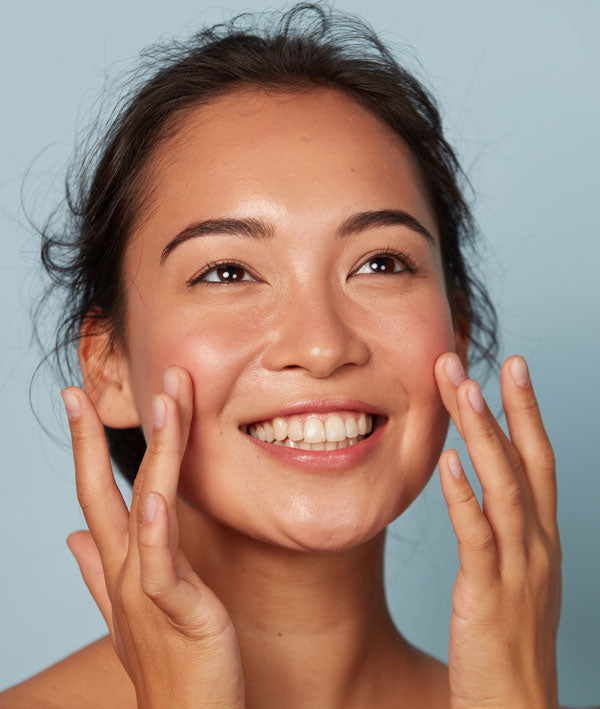Using niacinamide and vitamin Cin your skincare routine can yield significant benefits, as both ingredients are potent in addressing various skin concerns. Historically, there was a misconception that using them together could reduce their effectiveness or cause adverse reactions.
This belief stemmed from outdated research where the two were combined under high-temperature conditions, leading to the formation of nicotinic acid, which can irritate the skin. However, modern formulations and typical usage conditions have debunked this myth, confirming that niacinamide and vitamin C serum can be safely and effectively used together.
What Does Niacinamide Do For The Skin?
While many are familiar with vitamin C, niacinamide isn’t quite as well known – but that doesn’t mean it isn’t worthy of a spot in your routine. When applied topically, this water-soluble B vitamin is able to provide restorative benefits. We’ll dive into the specific results below, but in short, it works to promote even-toned, balanced, and more resilient skin.
Benefits Of Niacinamide
Niacinamide is a multitasker that offers a range of impressive benefits. Here’s how it can improve the complexion:
Promotes a More Even Skin Tone: Niacinamide is able to block the transfer of melanin (which is responsible for skin pigment) to the top layer of the skin. This means it can help fade the appearance of discoloration (such as post-inflammatory hyperpigmentation and dark spots) for a more even complexion.
Balances Sebum Production: The B vitamin is known for its ability to regulate the production of sebum, which is your skin’s natural oil. This makes it a particularly great ingredient for those with oily skin looking to reduce shine and prevent clogged pores. It may even minimize breakouts for those with acne-prone skin.
Refines the Appearance of Enlarged Pores: By working to regulate oil production and reduce congestion in the skin, over time, niacinamide can help refine the look of enlarged pores so that they are less noticeable.
Reduces Inflammation: This B vitamin has anti-inflammatory benefits. This means it can help minimize inflammation and reduce redness and irritation caused by conditions like rosacea, eczema, and acne.
Improves Barrier Function: When the skin barrier is lacking in ceramides, it’s more prone to irritation and dryness. Niacinamide supports overall barrier health and function by promoting the skin’s natural production of ceramides. By enhancing the barrier, it also improves the skin’s ability to defend itself against environmental harm that can dull the complexion and lead to signs of aging.
Who Should Be Using Niacinamide?
Good news: niacinamide works for all skin types and is gentle on the skin, so anyone can use it in their routine. That said, it has been reported that a small number of people may experience flushing when using it topically. If you have more sensitive skin, it’s smart to patch test first to ensure you don’t experience any adverse reactions.
As noted above, niacinamide can help refine the appearance of pores and control excess sebum production – two major concerns that often affect those with oily skin. However, given the other benefits, the ingredient is also suitable for anyone looking to improve skin tone, reduce inflammation, and enhance overall skin health and strength.
What Does Vitamin C Do For The Skin?
Much like niacinamide, vitamin C is a multitasker. The antioxidant works to defend the skin against damage while at the same time boosting radiance and promoting a more youthful complexion. To get the best results, you’ll want to consistently use a potent, well-formulated vitamin C product – like our Vitamin C Boost Serum.
Benefits Of Vitamin C
Vitamin C is one of the most popular skincare ingredients, thanks to its wide range of benefits. Here is a breakdown of how vitamin C affects the complexion:
Defends Against Free Radical Damage: Vitamin C may be best known for its benefits as an antioxidant. It helps protect the skin against free radicals from environmental aggressors. Free radicals cause damage to the skin, which can visibly manifest in the form of dullness and signs of aging. They can also negatively impact barrier health.
Promotes a More Youthful Complexion: Vitamin C promotes the production of collagen, a protein that gives our skin strength and structure. Our natural levels of collagen decrease as we age, which leads to signs of aging. By supporting collagen in the skin, vitamin C slows down the aging process and helps minimize the look of fine lines and wrinkles while tackling a loss in firmness and elasticity.
Brightens the Complexion: This vitamin also works to reduce melanin production. By doing this, it fades the appearance of discoloration and promotes a radiant and even skin tone.
Who Should Be Using Vitamin C?
Given its wide range of benefits, everyone can use vitamin C in their skincare routine. The vitamin is one of the most effective ingredients for protecting the skin against free radical harm, and is also essential for maintaining a radiant and youthful complexion. It can cause irritation when used in higher concentrations, so those with sensitive skin may want to patch test their product of choice before adding it to their routine.
Benefits of Using Niacinamide & Vitamin C
Using niacinamide and vitamin C togetherin your skincare regimen can offer a synergistic approach to achieving healthier skin:
Enhanced Brightening: Vitamin C inhibits melanin production, reducing hyperpigmentation, while niacinamide prevents the transfer of melanin to skin cells, leading to a more even skin tone.
Improved Skin Elasticity: Vitamin C stimulates collagen synthesis, enhancing skin firmness, and niacinamide supports the skin barrier, contributing to overall skin resilience.
Antioxidant Protection: Both ingredients offer antioxidant properties, protecting the skin from environmental stressors and free radical damage.
Reduced Inflammation: Niacinamide's anti-inflammatory properties can soothe irritation, complementing vitamin C's potential to cause mild irritation in sensitive individuals.
Incorporating Niacinamide & Vitamin C Into Your Skincare Routine
Can you mix vitamin C and niacinamide?To maximize the benefits of using niacinamide and vitamin C together, consider the following approaches:
-
Layering Separate Products: Apply a vitamin C serum after cleansing in the morning, followed by a niacinamide-containing moisturizer. This sequence allows vitamin C to penetrate the skin effectively, with niacinamide enhancing hydration and soothing potential irritation.
-
Using Combined Formulations: Some products are specifically formulated to include both niacinamide and vitamin C, ensuring stability and compatibility. These formulations simplify application and ensure both ingredients work harmoniously.
-
Time-Based Application: If you prefer or if your skin is sensitive, use vitamin C in your morning routine to protect against environmental damage, and apply niacinamide in the evening to aid in skin repair and regeneration.
Considerations for Sensitive Skin
While combining niacinamide and vitamin C is generally safe, individuals with sensitive skin should introduce these ingredients gradually:
Patch Testing: Before applying new products to your face, perform a patch test on a small skin area to check for adverse reactions.
Gradual Introduction: Start by using each ingredient on alternate days or at different times of the day, then slowly increase frequency as your skin builds tolerance.
Monitor Skin Response: If you notice redness, itching, or irritation, adjust usage frequency or consult a dermatologist for personalized advice.
Vitamin C and niacinamide together offer a multifaceted approach to achieving a brighter, more youthful complexion. By understanding their individual benefits and how they complement each other, you can effectively incorporate them into your daily regimen. Whether through layering separate products, using combined formulations, or timing applications appropriately, this duo can address various skin concerns, from uneven tone and texture to fine lines and environmental damage. Always consider your skin's unique needs and responses, and consult with a skincare professional if you have specific concerns or conditions.






